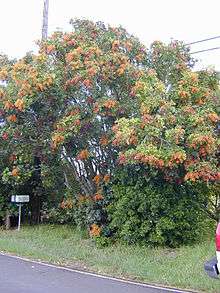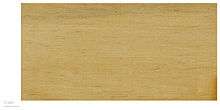Schefflera
Schefflera /ˈʃɛflərə/[1] is a genus of flowering plants in the family Araliaceae. With an estimated 600-900 species, the genus represents about half of its family. The plants are trees, shrubs or lianas, growing 4–20 metres (13–66 ft) tall, with woody stems, the absence of articulated pedicels and armaments, and palmately compound leaves.
| Schefflera | |
|---|---|
 | |
| Schefflera arboricola in Hawaii | |
| Scientific classification | |
| Kingdom: | Plantae |
| Clade: | Tracheophytes |
| Clade: | Angiosperms |
| Clade: | Eudicots |
| Clade: | Asterids |
| Order: | Apiales |
| Family: | Araliaceae |
| Subfamily: | Aralioideae |
| Genus: | Schefflera J.R.Forst. & G.Forst. (1775) |
| Diversity | |
| c. 600 species | |
Several species are grown in pots as houseplants, most commonly Schefflera actinophylla (umbrella tree) and Schefflera arboricola (dwarf umbrella tree). Numerous cultivars have been selected for various characters, most popularly for variegated or purple foliage. Schefflera species are used as food plants by the larvae of some Lepidopteran species including Batrachedra arenosella (recorded on S. stellata). Schefflera arboricola and Schefflera actinophylla can be used to attract birds.[2]
The genus is named in honor of Johann Peter Ernst von Scheffler (born in 1739), physician and botanist of Gdańsk, and later of Warsaw, who contributed plants to Gottfried Reyger for Reygers book, 'Tentamen Florae Gedanensis'.[3][4][5]
Fossil record
Two fossil fruits of †Schefflera dorofeevii have been extracted from bore hole samples of the Middle Miocene fresh water deposits in Nowy Sacz Basin, West Carpathians, Poland.[6]
Systematics
The circumscription of the genus has varied greatly. Phylogenetic studies have shown that the widely used broad circumscription as a pantropical genus is polyphyletic, but it remains to be seen how this will affect the classification of the genus.[7][8] Five polyphyletic clades of Schefflera exist, all of which are geographically isolated from one another. This implies parallel evolution of traits within the genus.[9]
Species
Taxonomy

The genus has had a turbulent taxonomic history; the list of synonyms includes:
- Actinomorphe (Miq.) Miq.
- Actinophyllum Ruiz & Pav.
- Agalma Miq.
- Astropanax Seem.
- Bakeria Seem.
- Brassaia Endl.
- Cephaloschefflera (Harms) Merr.
- Crepinella Marchal
- Didymopanax Decne. & Planch.
- Dizygotheca N.E.Br.
- Geopanax Hemsl.
- Heptapleurum Gaertn.
- Neocussonia Hutch.
- Nesopanax Seem.
- Octotheca R.Vig.
- Parapanax Miq.
- Paratropia (Blume) DC.
- Scheffleropsis Ridl.
- Sciadophyllum P.Browne
- Tupidanthus Hook.f. & Thomson
References
- Western Garden Book (6th ed.). Sunset Pub Co. 1995. pp. 606–607. ISBN 978-0-376-03850-0.
- Johan Dalgas Frisch, Christian Dalgas Frisch (2005). Aves Brasileiras e Plantas que as atraem. São Paulo: Dalgas Ecotec. ISBN 85-85015-07-1.
- Forster. J.R. and Forster, G. Characteres Generum Plantarum. 1776
- Reyger, G. Tentamen Florae Gedanensis. vol. 2. 1766
- Schumann, E., ed. (1893). "Die einheimisclien Mitglieder der Gesellschaft, Lebensläufe". Schriften der Naturforschenden Gesellschaft in Danzig. 8 (2): 83.
- Łańcucka-Środoniowa M.: Macroscopic plant remains from the freshwater Miocene of the Nowy Sącz Basin (West Carpathians, Poland) [Szczątki makroskopowe roślin z miocenu słodkowodnego Kotliny Sądeckiej (Karpaty Zachodnie, Polska)]. Acta Palaeobotanica 1979 20 (1): 3-117.
- G. M. Plunkett, Porter P. Lowry II, D. G. Frodin & Jun Wen (2005). "Phylogeny and geography of Schefflera: pervasive polyphyly in the largest genus of Araliaceae". Annals of the Missouri Botanical Garden. 92 (2): 202–224. JSTOR 3298514.CS1 maint: multiple names: authors list (link)
- Pedro Fiaschi & Gregory M. Plunkett (2011). "Monophyly and phylogenetic relationships of Neotropical Schefflera (Araliaceae) based on plastid and nuclear markers". Systematic Botany. 36 (3): 806–817. doi:10.1600/036364411X583754.
- Plunkett, Gregory M; Lowry, Porter P; Frodin, David G; Wen, Jun (2005). "Phylogeny and geography of Schefflera: Pervasive polyphyly in the largest genus of Araliaceae". Annals of the Missouri Botanical Garden. 92 (2): 202–224.
External links
| Wikimedia Commons has media related to Schefflera. |
| Wikispecies has information related to Schefflera |